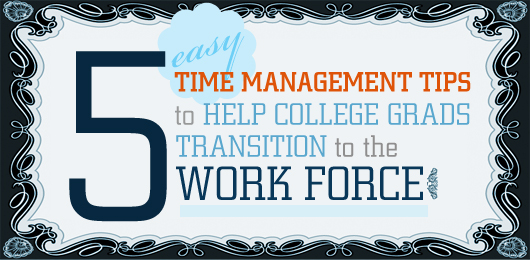One of the biggest adjustments I had to make upon entering the professional world was time management. Sure, when I was in college I had to make sure I got all my homework done for a given class, but now there’s so much more to keep straight. Gone are the days of being able to not complete the required reading for a class (but still being able to fake your way through it), oversleeping for an exam, or not finishing your homework, now we have to actually get our shit done and get it done on time.
Of course, I assume I’m not the only one that was, at one point a degenerate alcoholic (I went to a state school, it’s like a pre-requisite for graduation), and if I’m right everyone else has had a tough time adjusting. If I oversleep and miss a meeting, it’s no longer emailing my class and asking what I missed, now I have to face my coworkers and explain to them why I was absent and what I’m going to do to make sure it doesn’t happen again. I went through these embarrassing moments so you (hopefully) won’t have to.
These five things may seem very simple, but it’s surprising how many people I see that fail at each one of them. Someone who can’t stick to a schedule and become more efficient are typically very unorganized, tardy, and generally less effective employees because of it. Try to adjust to these simple guidelines, and you’ll be amazed at how much your quality of life improves.
Don’t worry about things that don’t accomplish anything
I personally have a problem with getting caught up doing busy work, and more often than not it’s work that doesn’t really move you towards your goal. When you’re setting out to start a project, try to outline what needs to be done in order to complete it, and secondary things that you can work on. Think of the secondary things as “finishing touches” on a job well done.
Get a calendar
This is probably the most important, yet also the most often overlooked, component of time management. I personally use Google Calendar and sync it to my Blackberry. It allows me to keep different calendars for my personal and business lives. However, if you don’t have a Blackberry or other smartphone, a paper calendar will most certainly suffice. You’ll be amazed at how much easier your life gets when you have everything clearly written out in front of you.
Maintain a set schedule
For me, the mornings are the most difficult time of day. Or, at least, they used to be. Once I developed a routine, my days got started so much easier. Start by setting a time that you can get up everyday and one that gives you plenty of time to finish your morning routine. As for what you should add to your routine, allow everything from hitting the snooze button to stopping at the painfully slow coffee shop for a cup of burnt coffee.
You’ll be amazed how easily the rest of your day will go when it starts off with something familiar.
Don’t put time pressure on yourself
Time pressure is one of the few things that can completely ruin your day, but that you have total control of. Granted, there are some exceptions (meetings running long, exceptionally bad traffic, etc) but, for the most part, you are in control of how much time you give yourself to get from one event, or task, to another.
So, if you know you have to turn in your payroll by 11am on Monday, don’t wait until 10:30am to start it. Giving yourself ample time to finish a scheduled task can help to free up more time for other, unplanned, events throughout your day. Life isn't full of term papers that you can squeak out 3 hours before they're due and still swing a B+ anymore.
Complete things in order of importance
It can be easy to lose track of the things that are important when you have a lot on your plate. Sometimes going out with friends from work takes precedence over tasks that you need to complete. The best way to save yourself some stress is to plan out what needs to be done, and how important each job is.
If you’re out of clean underwear, need to workout, have a project at work due, and want to go out with friends, try to order those things and cut out what you can do another day. Sometimes it can be frustrating to miss out on things, but try to remember the pressure that you’ll feel when you realize you're spending a couple hours doing something that isn’t incredibly important.
















